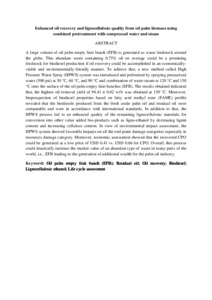Citation
Md Yunos, Noor Seribainun Hidayah and Chu, Chang Jie and Baharuddin, Azhari Samsu and Mokhtar, Mohd Noriznan and Sulaiman, Alawi and Rajaeifar, Mohammad Ali and Larimi, Yaser Nabavi and Talebi, Ahmad Farhad and P. Mohammed, Mohd Afandi and Aghbashlo, Mortaza and Tabatabaei, Meisam
(2017)
Enhanced oil recovery and lignocellulosic quality from oil palm biomass using combined pretreatment with compressed water and steam.
Journal of Cleaner Production, 142 (pt. 2).
3834 - 3849.
ISSN 0959-6526; ESSN: 1879-1786
Abstract
A large volume of oil palm empty fruit bunch (EFB) is generated as waste feedstock around the globe. This abundant waste containing 0.75% oil on average could be a promising feedstock for biodiesel production if oil recovery could be accomplished in an economically-viable and environmentally-friendly manner. To achieve that, a new method called High Pressure Water Spray (HPWS) system was introduced and performed by spraying pressurized water (500 psi) at 30 °C, 60 °C, and 90 °C and combination of water-steam at 120 °C and 150 °C onto the surface of the oil palm empty fruit bunches (EFB). The results obtained indicated that, the highest oil removal yield of 94.41 ± 0.02 wt% was obtained at 150 °C. Moreover, bioprospection of biodiesel properties based on fatty acid methyl ester (FAME) profile revealed that the biodiesels produced from the fresh crude palm oil and residual oil were comparable and were in accordance with international standards. In addition to that, the HPWS process led to an enhanced quality of the remaining lignocellulosic materials for conversion into other value added bio-products such as ligno-ethanol by decreasing lignin content and increasing cellulose content. In view of environmental impact assessment, the HPWS system showed favorable impacts on all the end-point damage categories especially in resources damage category. Moreover, economic assessment showed that the recovered CPO could be generated at a low price of USD 0.41 vs. USD 0.66 for CPO. Overall, this process could drastically increase the market value of an abundant type of waste in many parts of the world, i.e., EFB leading to the generation of additional wealth for the palm oil industry.
Download File
![[img]](http://psasir.upm.edu.my/61724/1.hassmallThumbnailVersion/Enhanced%20oil%20recovery%20and%20lignocellulosic%20quality%20from%20oil%20palm%20biomass%20.pdf)  Preview |
|
Text
Enhanced oil recovery and lignocellulosic quality from oil palm biomass .pdf
Download (6kB)
| Preview
|
|
Additional Metadata
Actions (login required)
 |
View Item |

